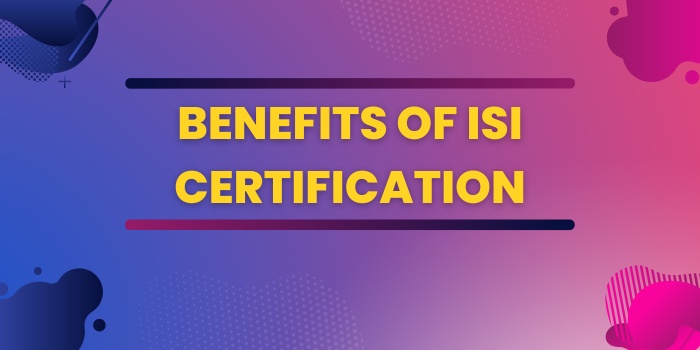Benefits of ISI Certification

ISI certification provides numerous benefits for businesses in India. In this article, we will explore some of the key advantages of obtaining ISI certification and how it can help your company grow.
What is ISI Certification?
Indian Standards Institution or ISI certificate is a type of standardization mark afforded by the Bureau of Indian Standards (BIS) to products and services that meet the requirements as laid out in the relevant Indian Standard. The ISI mark ensures that a product has passed certain quality control tests specified by the BIS. It signifies that the certified goods are at par with national standards for safety, quality and performance.
Why Should You Consider ISI Certification?
There are several compelling reasons why businesses should pursue ISI certification for their products and services. Let's take a look at some of the major benefits:
Gains Credibility in the Market
The ISI mark is a widely recognized and trusted quality seal in India. Customers know that products displaying the ISI logo meet stringent quality norms. This helps boost consumer confidence and demand for your offerings.
Increases Competitiveness
With ISI certification, you gain a competitive edge over non-certified competitors. Customers are more likely to choose certified products, giving you an advantage in the market.
Opens Up Government Tenders
Many government contracts and tenders mandate ISI certification. Certification allows you to bid for and win lucrative government projects and supply contracts.
Ensures Legal Compliance
The BIS Act mandates ISI certification for several product categories. Certification demonstrates your commitment to quality and helps ensure your business remains compliant with relevant quality control laws.
Supports Export Potential
ISI certification boosts export opportunities as it signals adherence to international quality standards. Several countries accept the ISI mark, easing market access abroad.
Protects Against Substandard Goods
The presence of ISI certified competitors discourages the production and sale of inferior or counterfeit variants of your products. This protects your brand and the industry.
How to Get ISI Certification
To obtain the ISI mark, you need to follow these basic steps:
- Identify the relevant Indian Standard (IS) for your product or service
- Apply for ISI licensing with BIS
- Get your product or facility audited and tested by a BIS certificate recognized lab
- Receive the license and ISI mark upon successful clearance of tests
- Maintain quality and get recertified periodically
The process may take 4 to 6 months on average. Ensure you follow all application procedures and quality protocols carefully.
Frequently Asked Questions
Is ISI certification mandatory?
While voluntary for most products, ISI certification is mandatory under the BIS Act for certain categories like toys, pressure vessels, cables, construction materials etc.
How long is the certification valid for?
An ISI license is generally valid for two years. You need to get recertified upon expiry to retain the ISI mark.
What are the costs involved?
Testing and certification fees depend on the product and applicable Indian Standard. Expect to pay anywhere between Rs. 15,000 to 2 lakhs on average.
Can I export ISI certified goods?
Yes, the ISI mark facilitates exports. Several countries accept it under mutual recognition agreements with BIS. Make sure to check import regulations of specific markets.
What if I make changes to my certified product?
You must inform BIS of any modifications and get retesting and recertification done to retain the ISI license for the changed product.
In case you have found a mistake in the text, please send a message to the author by selecting the mistake and pressing Ctrl-Enter.
You must be logged in to comment.
Sign In /
Sign Up


No comments yet